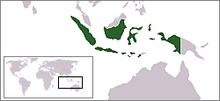Australian blitz on fish poaching
Wednesday, April 20, 2005

Map: Vardion of Wikipedia
Australian officials have impounded 27 Indonesian boats and 240 crew off the country's north coast, in what it says is the biggest operation against illegal fishing so far. Fisheries Minister, Ian Macdonald, told the nation's ABC Radio that a number of boats caught fishing for shark fin and reef fish had been taken to Gove and Darwin.
The nine-day joint navy, customs and army "Operation Clearwater" was continuing, and had taken months to plan.
"I think all of the illegal vessels up there, because of their inter-vessel communication will now be aware that there is a major sting on by the Australian authorities and those that haven't been arrested, I think will be hightailing it back to Indonesian ports as we speak," said Senator MacDonald.
Intelligence indicated what he called "organised transnational criminal activity", including some Asian connections beyond the Indonesian village ports where the vessels originated, but the activity was apparently limited to illegal fishing, and did not include smuggling.
"We are talking about large-scale commercial operations rather than simply subsistence fishing," Macdonald said in a statement, indicating that fifteen of the boats were large vessels with ice for storage. Two boats each had one tonne of fish, and shark fin.

Photo: Gallery/imagegallery.htm Lars Lentz
Fishing by some Indonesian peoples has occurred legitimately in the area between the two nations for hundreds of years before European colonization. A 1906 Australian claim on as much as 80% of the waters has since been softened by a Memorandum of Understanding (MOU) between the two governments, recognizing some traditional fishing rights.
However analysts say the Australian government strategy is flawed, since it is based on the fishing technology employed, rather than catch numbers. [1] [2] [3]
At time of writing, it has not been ascertained whether the currently detained vessels were fishing in such "traditional" waters or not, or whether they were operated by crews who would have traditional fishing rights, if they had been in compliance with the MOU.
Senator MacDonald told the ABC Radio programme AM that he expected in the case of those thought to have been fishing in Australian waters illegally, the captain and perhaps the senior fishing master would be charged, with other crew being immediately repatriated to Indonesia.
As for the boats, "We're required by international law to offer them to bond them back to the owners, but as the crew are immediately repatriated the ability of the owners to get them back to Indonesia ... is fairly limited," the Senator explained.
"I would expect that most of these boats apprehended in operation Clearwater will actually be forfeited to the crown and will be destroyed."
The fishermen were expected to appear in court next week, reported Reuters news agency. An Indonesian fisherman was last week fined $A130,000, setting a new record, after his boat was caught off with over 100kg of dried reef fish, 300kg of fish on ice and 10kg of dried shark fin.
The Northern Territory Fisheries Minister, Kon Vatskalis, on ABC Radio asked the Federal Government to commit the same level of resources permanently.
"Provide the extra funding, provide the extra resources to the Navy and the Customs and then they will be able to stop the illegal boats, not only when they run an operation but every day, every week, every month," Mr Vatskalis told the ABC.
Sources
- AM, Reporter: Alexandra Kirk. "Govt blitz on illegal fishing gets results" — Australian Broadcasting Corporation, April 20, 2005
- ABC News Online. "NT wants more action over illegal fishing" — Australian Broadcasting Corporation, April 20, 2005
- Reuters. "Australia nets illegal fishing operation" — Reuters, April 20, 2005
- Dr. N. Stacey. "Crossing Borders: Implications of the Memorandum of Understanding on Bajo fishing activity in northern Australian waters" — South Pacific Regional Environment Programme, 2001
- Campbell Watson. "Permeable border" — Inside Indonesia (No. 54), June, 1998
- Jill Elliott. "Fishing in Australian Waters" — Inside Indonesia (No. 46), March, 1996
See also
- Robyn Williams, The Science Show. "Throw the Big Fish Back" — Australian Broadcasting Corporation, April 16, 2005
- Paul Toohey. "Fishers of men find holes in our coastwatch net" — The Weekend Australian, August 14, 1999
